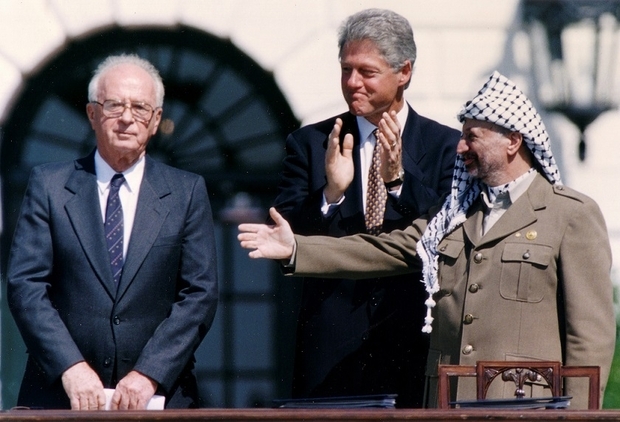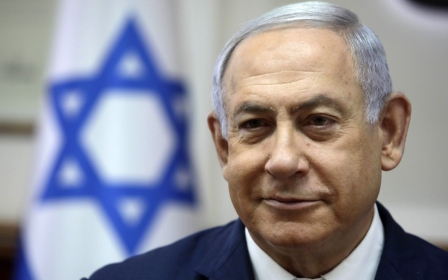A quarter of a century after Oslo, the game is over for Palestinians

The US administration has supported Israel’s policy of building settlements in the occupied Palestinian territories - deemed illegal by international law - and attempted to grant them legitimacy.
After decades of international condemnation, US Secretary of State Mike Pompeo last month said that “the establishment of Israeli civilian settlements in the West Bank is not, per se, inconsistent with international law”. With this far-reaching statement, the US - the official patron of the “peace process” - eliminated the foundations of a Palestinian state of any kind, and ensured its support for the occupation’s boundless control over Palestinian land.
Disconnecting Palestinian communities
It is a tragic end to the “Middle East peace process” and the Bush-era “road map to a Palestinian state”. Since then, things have been going in the opposite direction. Not only has the Israeli occupation expanded its illegal settlements, but it has also placed them strategically in order to disconnect the Palestinian communities located in between.
After giving the idealistic promise of a prospective state, yet failing to abide by the conditions for its establishment, the Trump administration set the status quo with its declaration of Jerusalem as “the capital of Israel” - a move no previous US president had dared to make. In doing so, Washington eliminated any hopes left for the “peace process”.
New MEE newsletter: Jerusalem Dispatch
Sign up to get the latest insights and analysis on Israel-Palestine, alongside Turkey Unpacked and other MEE newsletters
Those who signed these fatal agreements with the occupier under US patronage still hold onto the official Palestinian stance
These developments have dealt a fatal blow to the “two-state solution” - a concept that has revealed itself to be a hoax marketed to Palestinians for a quarter of a century. The French newspaper L’Humanite wrote on 20 November: “Trump wants to remove Palestine from the map.”
The game is over, and Palestinians must now choose a form of life under occupation - potentially under a different label, such as “limited autonomy”, leaving the impression that a solution has been reached.
It is important to remember that the “transitional phase” following the Oslo Accords was supposed to lead to a comprehensive deal by 1999. Instead, Palestinians came under the authority of a transitional administration with a Palestinian flag, while remaining under occupation, with Palestinian intelligence services obligated to serve the Israeli security system under the deceptive label of “security coordination”.
Easing the occupation's burden
The situation appears comfortable for the Israeli occupation’s government. It eases the burdens on it and, in many ways, suppresses any possible intifada or act of resistance in the future - a disastrous consequence for any national liberation movement.
Yet, the Palestinian Authority (PA) does not want a public debate with its people about the reality of the situation to which it has contributed. The PA has declared that negotiations are its only option, and over a quarter of a century, an elite political, bureaucratic, security and economic superiority has crystallised. Maintenance of these relations means continuing its special privileges, which are not enjoyed by the rest of the people.
Those who signed these fatal agreements with the occupier under US patronage still hold onto the official Palestinian stance, dating back to the first Oslo agreement in 1993. Palestinian President Mahmoud Abbas, the “architect” of Oslo, avoids accountability for this dangerous creation and its consequences to this day, and has feared presidential elections since his constitutional term ended in January 2009.
Successive Israeli governments found a golden opportunity in this destabilised Palestinian leadership to maintain the status quo of the occupation, especially after the mysterious demise of iconic leader Yasser Arafat.
The PA dwells on securing its budget and creating a dependency on “international donors”, while failing to seek alternative financial strategies.
Major promises broken
Europe has played an essential role in marketing this illusion to Palestinians, shackling them to the thought of a “viable Palestinian state”. Despite European criticism of Israel’s separation wall, multiplying settlements and demolitions of Palestinian homes, no real pressure has been exerted on the Israeli government, which continues to enjoy cooperation agreements and positive relations with European states.
A quarter of a century after Oslo, it is clear that the US has abandoned its commitment to the “peace process”, while the chances of implementing a two-state solution have plummeted.
What will remain in the foreground is the “architect” of the agreement, entangled in his local defeats and taking public attention away from the grave failures of the struggle for national liberation.
Great promises are being broken as the world watches. Generations of angry Palestinians recognise what has happened over the past two and a half decades as a long game that has deceived their leadership, lured them into a trap and fatally harmed their cause.
The game is over, and the fate of the “peace process” sealed. Yet none of those involved will confront the Palestinian people with the truth of this strategic failure, for fear of pouring oil on the fire and triggering a groundswell of Palestinian rage.
The views expressed in this article belong to the author and do not necessarily reflect the editorial policy of Middle East Eye.
Middle East Eye delivers independent and unrivalled coverage and analysis of the Middle East, North Africa and beyond. To learn more about republishing this content and the associated fees, please fill out this form. More about MEE can be found here.







